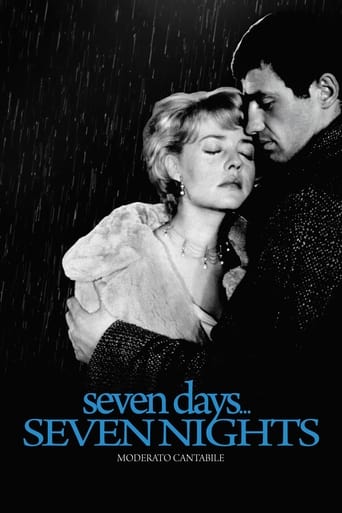Kirpianuscus
the atmosphere. the Duras mark. the mark of Peter Brooks. and the performances. a Belmondo who conquest a special status, exploring a role who has the force of nuances. Jeanne Moreau - the same and different. the piano's lessons. and the city. a film about solitude in a honest, cruel manner. slices from Madame Bovary. and the search of sense in the presence of the other. the mixture of temptation and fear, expectation and sin, the form of illusion and the brutal end does it a gem. not only for the artistic virtues but for a special manner to use the novel for the portrait of a small world. a film of music as piece from silhouettes, dialogs and fall. a not real comfortable film. but useful.
Armand
for the Duras's atmosphere. for the lead actors. for the story, landscapes, dialogs, the piano lesson or for its end. for the illustration of a state of soul as result of a mixture of sin, fear, high expectations and fall. a film about a woman and a man. all in simple manner presented. a town. and few meetings. and level of dark revelation. a film of silhouettes and silence. and it is enough for discover an universe who could be part from yourself. a film about choices. and about a strange form of music. Jeanne Moreau is not a surprise. Belmondo is the perfect choice despite the expectations about other actor if you read the novel. the result - not comfortable but good occasion for reflection. about love. and about versions of Madame Bovary.
Bob Taylor
This has to be one of the dullest films of the early Sixties. Remember that Godard, Malle, Truffaut and company had been challenging the traditions of story telling; the world seemed young again, and full of possibilities. Moderato cantabile has nothing of this spirit. It might have been made by an old-guard director like Clément or Delannoy (if they had decided to take a chance on a Duras script).There isn't much energy or interest in this story: what happens in the first ten minutes is endlessly rehashed throughout the remainder. Belmondo is ill at ease here, or at least seems that way to me--there is no chance for any extroversion, exuberance or even anger from the character. Jeanne Moreau is used decoratively (Brook must have seen what Resnais was able to do with Delphine Seyrig in Last Year In Marienbad) and always looks elegant, if never really desperate or anguished. You know something's wrong when the piano teacher provides much of the dramatic interest: she's bullying the child into giving her a Diabelli sonata "moderately, with a singing feeling".Note: I have just remembered that Clément did do a Duras script (Barrage contre le Pacifique) in 1958.
mackjay2
Peter Brook's MODERATO CANTABILE was praised in its day, but has nearly been forgotten. Not a crowd pleaser, this is a film that will probably appeal to a limited audience. The screenplay is based on the Marguerite Duras novel of the same name. Duras deliberately avoided dramatic incident for the main characters and wanted to only observe their interior states. In the film, Brooks tries to find an equivalent for this approach and he succeeds. From the opening scene, we can see we are in for an unusual type of film experience. A young boy is in the middle of a piano lesson. We see his teacher react with impatience to the boy's distracted dreaminess. The boy's mother, Anne (Jeanne Moreau), tries to keep him on track, but little is accomplished. Then, a woman's scream is heard from outside the window. Boy, mother and teacher look out to see a great deal of commotion and police presence in front of a café next door. When the woman goes down to look, she sees a female corpse in the café and a man being led away by police. Surreptitiously watching Anne is Chauvin (Jean-Paul Belmondo). For the first third of the film, he will follow the mother and son around the town (Blaye, near Bordeaux). Idly rich and bored, the pair have little to do but wander in the woods and ride the ferry across the dull, gray Gironde river. Chauvin has little to do himself and one day he approaches Anne. After a short time, they begin a romance. The romance is presented in a very muted, unprovocative way. What is interesting about it is the way that Anne insists on Chauvin narrating his rendition of the story behind the shot woman and the man in the café. It's clear that an analogy is being made between that couple and the film's protagonists. The drama in this story happens to other people, not to the main characters. Clandestine meetings continue and at one point Chauvin decides he has had enough of Anne's need to live a vicarious tragedy. He puts her off and refuses to continue. The film goes to great length to express the isolation of these characters: a bored, lonely rich man's wife in an enormous estate and a solitary factory worker (we are only told he works there, we don't see it). Brooks and his cinematographer Armand Thirard do a fine job of establishing the overwhelming melancholy of this story. Locations are used to express the characters' emotional states in much the same way that Antonioni uses locations in his films. This film seems to be saying that some are trapped in their lives and there is only temporary, perhaps imagined, escape from the dull greyness of it all. A piano sonatina by Diabelli is the only music used for the soundtrack and its Mozartean prettiness seems at odds with the somber tale, perhaps a small touch of irony. Or perhaps an expression of the way small amounts of sunlight can be let into a gray world, singing, but with moderation.

